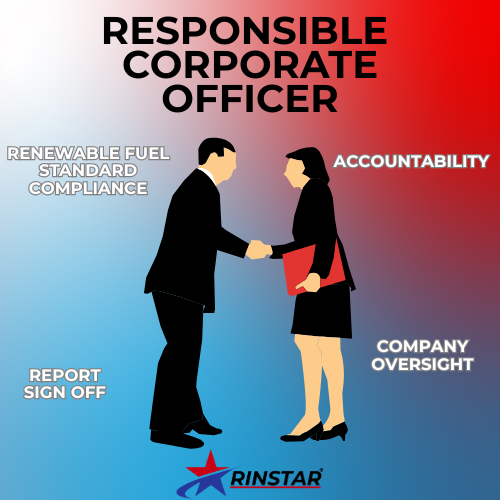In the world of the Renewable Fuel Standard (RFS), few roles carry more responsibility than that of the Responsible Corporate Officer (RCO). This individual serves as the company’s point of accountability to the EPA. They ensure all RFS obligations are met and compliance remains airtight. For biofuel producers and obligated parties, understanding what the RCO does, the potential risks they take on, and the traits that make an effective officer is critical to running a smooth, compliant operation. That’s why RINSTAR has put together a clear breakdown of the RCO role along with some practical recommendations to help your team stay informed and confident in your compliance efforts.

Legal Responsibilities Under the RFS
The Responsible Corporate Officer (RCO) doctrine (established through landmark Supreme Court cases) holds that a corporate officer may be personally liable for violations of public welfare laws. Laws such as the Clean Air Act, which governs the Renewable Fuel Standard, even if they were not directly involved in the violation.
Under the RFS, the RCO’s primary legal responsibility is to maintain the integrity of all activities related to the program. This includes:
- Accurate Reporting: Ensuring all information submitted to the EPA, particularly through the EPA Moderated Transaction System (EMTS), is truthful and accurate.
- Valid RIN Generation: Implementing and overseeing a system to ensure every RIN is generated for a qualifying batch of renewable fuel according to an approved pathway.
- Preventing Fraud: Actively preventing the generation of fraudulent or invalid RINs.
- Recordkeeping: Maintaining all required documentation related to feedstock, production processes, and RIN transactions.
Simply put, the Responsible Corporate Officer (RCO) is the individual the EPA holds accountable if an RFS violation occurs. Stating that they were unaware of an employee’s actions is not considered a valid defense if the RCO had the authority to prevent the issue but did not ensure proper oversight.
The Risks
The personal liability that comes with serving as an Responsible Corporate Officer (RCO) is significant and extends well beyond standard corporate penalties. Because a single RIN transaction can represent millions of dollars in value, the stakes are exceptionally high. The potential risks include:
- Criminal Charges: The Department of Justice actively prosecutes RFS fraud. An RCO can face criminal charges (up to a felony) for willfully submitting false information or generating fraudulent RINs.
- Personal Fines: Civil penalties are assessed on a per-day or per-RIN basis. These fines are levied against the RCO personally and can possibly reach millions of dollars, separate from any fines against the company.
- Debarment: An RCO can be permanently barred from participating in the RFS program.
For instance, if a plant manager generates invalid RINs from a batch of biofuel made with an unapproved feedstock, the RCO could still be held personally liable if they failed to establish and enforce a strong feedstock verification process.
Traits of a Strong RFS RCO
Selecting the right person for the RCO role is a critical business decision. We at RINSTAR recommend the following qualities in a RCO:
- Knowledgeable about the RFS: The RCO must have a grasp of the RFS regulations found in 40 CFR Part 80, including fuel pathways, RIN generation requirements, and EMTS reporting protocols. They must stay current with new and updated EPA rules and regulations.
- Proactive and Diligent: A strong RCO actively audits their entire compliance process, from feedstock purchase records.
- Clear Communication Skills: They must be able to translate complex regulatory requirements into clear, actionable procedures for plant operators, lab technicians, and administrative staff.
Tips for RFS Participants Without a Traditional C-Suite
Many participants in the RFS program, such as smaller biofuel plants or trading firms, may have a flat organizational structure. However, the EPA still requires a designated RCO.
- Formally Designate the RCO: Even in a partnership or a small company, one person must be officially named the RCO in all EPA registrations. This should be documented in the company’s operating agreement.
- Clearly Grant Authority: The designated RCO’s authority over all RFS-related activities, including EMTS account access and reporting, must be absolute and in writing.
- Engage Third-Party Experts: Use RFS consulting firms, legal counsel, or third-party compliance software companies for independent audits, pathway petitions, and navigating complex compliance scenarios. Engaging a Quality Assurance Program (QAP) provider is also an important step in demonstrating due diligence.
The Responsible Corporate Officer (RCO) plays a vital role as the final safeguard for a company’s RFS compliance. Choosing a capable and well-supported individual for this position ensures that compliance efforts remain strong, transparent, and consistent. When given the right tools, training, and authority, an RCO helps protect the company from costly penalties while also safeguarding leadership from personal and financial exposure. Empowering the RCO ultimately strengthens both accountability and trust across the entire organization.
At RINSTAR, we make it easier for RCOs and compliance teams to stay ahead of their responsibilities. Our platform streamlines RIN tracking, automates reporting, and centralizes key compliance documents. We give RCOs the visibility and confidence they need to oversee RFS operations effectively. With built-in tools for verification, audit preparation, and EMTS synchronization, RINSTAR helps organizations maintain transparency, accuracy, and peace of mind in every step of their RFS compliance journey.
📩 Contact us at services@cfch.com or schedule a personalized RINSTAR demo today.
